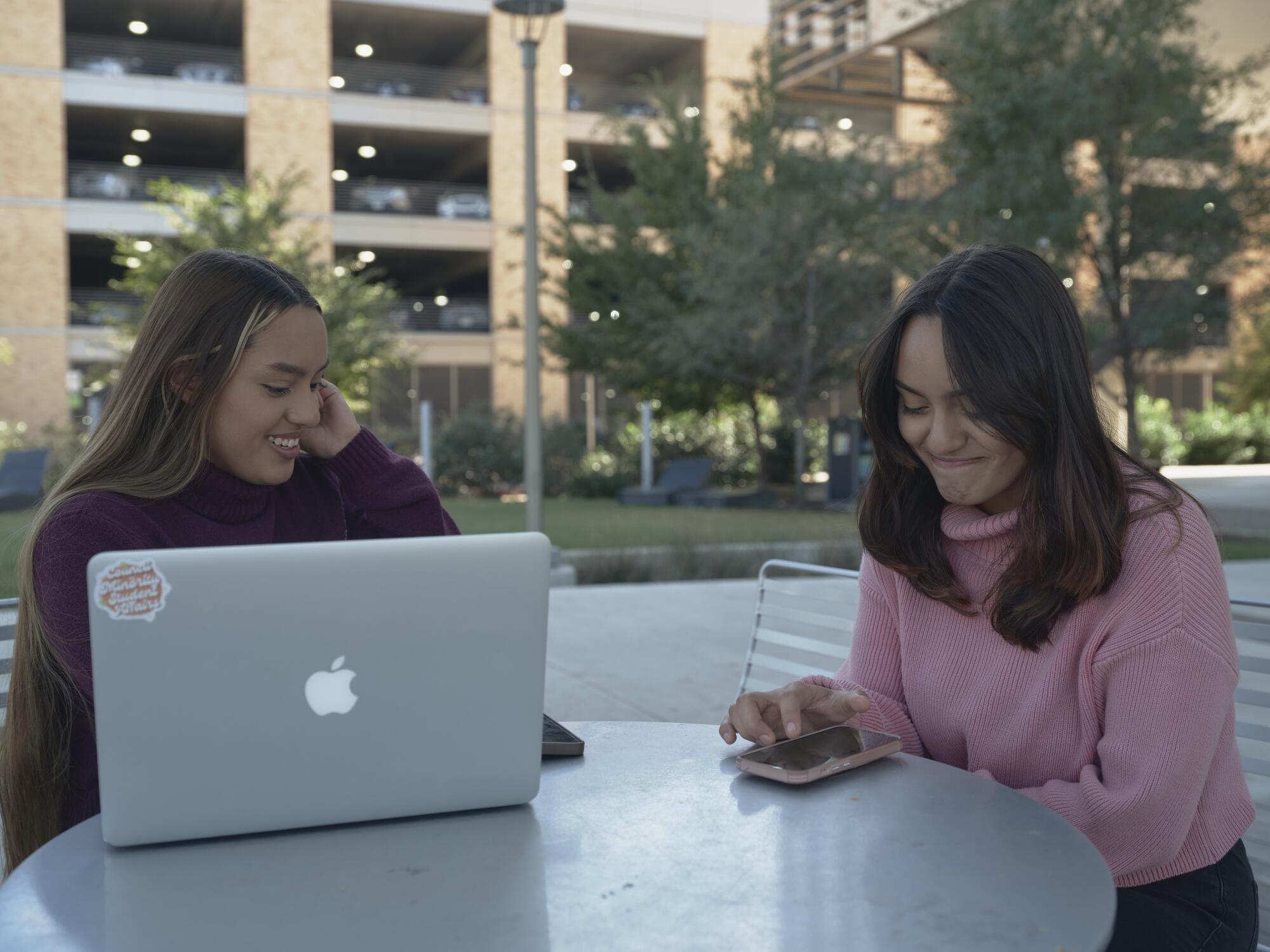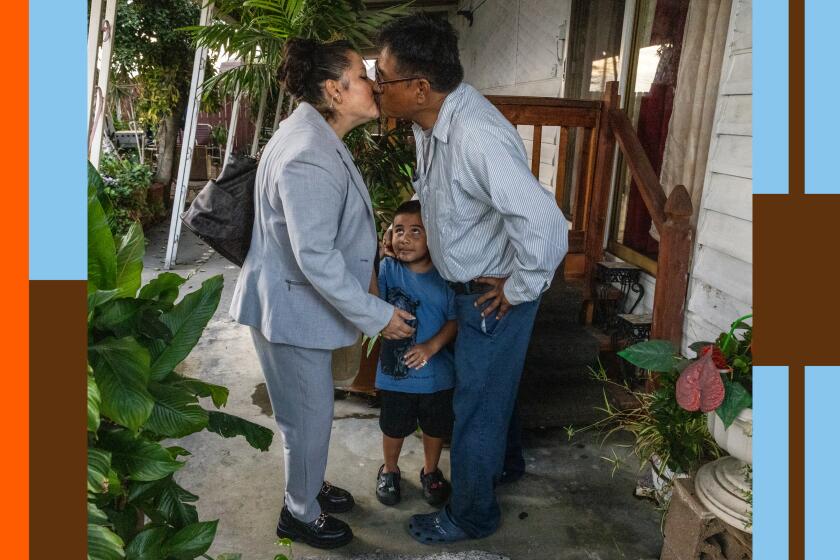
- Share via
One day.
For Judith Ortiz, whose parents brought her to this country from Durango, Mexico, when she was 2, a mere 24 hours have made the difference between a life of freedom and opportunity and one constrained by limits and obstacles.
Ortiz and her twin sister, Janette, were raised in suburban Dallas, where Judith was her high school’s valedictorian, graduating with a 3.96 GPA.
Both girls had remained in the country illegally as toddlers when their family overstayed a tourist visa. When they turned 18, they became eligible for benefits under Deferred Action for Childhood Arrivals, or DACA, the Obama-era program designed to shield from deportation many young people brought to this country illegally as children.
Drawing on an unprecedented poll, this series tells the stories of immigrant life in America today, putting their voices in the foreground.
Because the girls have the same birth date, the same address and the same surname, their lawyer suggested Judith mail her application a day after her sister to avoid confusion.
Janette’s paperwork was approved six months later, in June 2021. Shortly after, a federal judge in Texas blocked the government from approving additional DACA petitions. Judith’s application — and her future — have been on hold ever since. She can’t be sure that the mailing date, not some other arbitrary bureaucratic quirk, caused the fateful difference, but in her mind, that one-day delay in sending off the application is what has set their lives on different courses.
“Having DACA would make my life 100 times easier,” said the 21-year-old, who attends classes at Texas A&M alongside her sister. “I was always scared of getting pulled over. There’s things that people don’t really think about sometimes.”
Immigrants to the U.S. face extensive challenges, but they still report high levels of optimism about their futures and trust in American institutions, a comprehensive survey has found.
Judith took the Armed Services Vocational Aptitude Battery, hoping to enlist in the military, and scored well enough to enter West Point, only to be rejected because of her immigration status. That status also means she can’t legally get a job or a loan because she’s not eligible for a Social Security number.
Her twin, who entered the country on the same day and grew up in the same house, has a job, an apartment and a car loan.
Judith, who is set to graduate in December, is eligible to be deported back to a country she can’t remember while her twin sister can legally remain, work and study.
“I grew up in America. I don’t know [Mexican] culture very well. It’s not the same,” she said.
Few who work in immigration law are surprised by the story; the capriciousness of America’s broken immigration system seems to be the rule, not the exception.
“It’s a bit of layer cake,” said Travis Murphy, a former U.S. diplomat who is the founder and chief executive of Jetr Global Partners, a Washington-based firm that works to solve visa and immigrant issues for athletes and sports franchises. “Policies have been enacted year over year that don’t necessarily work directly, in a coherent way, with previous policies.”

“We don’t have consensus in what we want the outcome to be,” he added. “That’s the problem.”
The sometimes arbitrary and frequently confusing nature of American immigration law enforcement constrains the lives of millions of immigrants — those who live in the country legally as well as those here without legal status.
More than 4 in 10 immigrants who participated in a wide-ranging survey conducted earlier this year by the Los Angeles Times and KFF, formerly known as the Kaiser Family Foundation, said they don’t understand how the country’s immigration policies work, nor how those policies affect their families. Yet they have no choice but to rely on those policies to be able to work, study and sometimes simply exist in this country.
Roughly 1 in 4 immigrants said they’ve worry that they or a family member could be deported. The number is highest among the undocumented, but the fear is shared by one-third of legal permanent residents and 1 in 8 naturalized citizens. Many immigrants who have legal status have family members who do not.
Some 10.5 million people — precise estimates vary — lived in the U.S. without authorization in 2021. Roughly 1.8 million live in uncertainty, recipients of Temporary Protected Status, student visas, DACA or other protocols that either have time limits or can be revoked, with little notice, at any time. Tens of thousands more are detained each month at the southern border trying to join them.

Meanwhile, the pathway to legally immigrate to the U.S. has become so constrained that for many, it doesn’t truly exist.
The Cato Institute, in a June report titled, “Why Legal Immigration Is Nearly Impossible,” estimated that fewer than 1% of the people who apply to move permanently to this country are now able to do so.
“The government’s restrictive criteria render the legal paths available only in the most extreme cases,” wrote David J. Bier, Cato’s associate director for immigration studies. “Legal immigration is less like waiting in line and more like winning the lottery: It happens, but it is so rare that it is irrational to expect it in any individual case.”
The U.S. caps the number of permanent employment-based immigrants at 140,000 annually, with no more than 7% allowed from any one country. As a result, people in countries with large numbers of applicants could wait a lifetime. The wait for an employment-based green card for residents of India is 134 years, according to Cato’s estimate, based on government data. A U.S. citizen who wants legal permission for their married adult child to immigrate to the U.S. from Mexico would have to wait 160 years at the current rate of approval.

Those who do enter the U.S. legally aren’t exempt from the law’s complexities.
Six years ago, Agustina Vergara packed up her life and moved from Argentina to Southern California to finish a master’s program at USC.
With her employer’s help, she applied to exchange her student visa for one reserved for workers in fields requiring special knowledge. That’s when things went off the rails.
As she waited, Vergara’s father was diagnosed with cancer. She couldn’t go back to Argentina without abandoning her visa application, which would have meant starting the process over again with less chance of success. When he died, she couldn’t attend the funeral.
California has positioned itself as a haven for both documented and undocumented migrants, but in some ways, life in Texas isn’t much different, a detailed poll of immigrant attitudes shows. There’s only so much one state can do.
Weeks later, her lawyer gave her more bad news: She wasn’t going to get the visa anyway. The government offered no explanation why. Vergara was crushed.
“My thinking was perhaps a little too optimistic,” she said. “There is no way that a hardworking person that really loves America and wants to build a life here and contribute to make America the amazing country that it is — there is no way that they won’t have me.”

Like Judith Ortiz, Vergara, 35, had filed every form, paid every fee, followed every rule. She was, by all accounts, an outstanding student and a model citizen. Her background check came back as clean as hospital linen.
“There’s a point where it is so convoluted, so complicated, so nonsensical,” she said. “It cannot be an accident. It is, in a way, kind of designed to make it really difficult,” said Vergara, now an associate fellow at the Ayn Rand Institute, a libertarian organization based in Santa Ana. “Is this an immigration system or an anti-immigration system?”
Most immigrants, 84%, say they feel the U.S. immigration system has treated them and their families fairly, the Los Angeles Times/KFF poll found. But that number is notably lower among immigrants from Mexico, Central America and India, who face some of the longest wait times. It is also lower among the undocumented.
And even those who feel the process was fair can often find it an ordeal.
Vergara was eventually allowed to stay in this country after moving up her long-planned wedding and marrying her fiance, a U.S. citizen, at the Laguna Hills courthouse. Millions of others, however, have had to put their lives on hold.
Elvina Kovaleva and her husband were welcomed into this country, but it could be years before they know if they’ll be able to stay. A respondent to The Times/KFF poll, Kovaleva agreed to a follow-up interview by email.
“Our status,” she wrote, “is ‘seeking asylum.’”
Kovaleva, 28, and her husband, Yaroslav, both Russian citizens, left well-paying jobs in Moscow last year after Yaroslav was mobilized to fight in Ukraine, a war the couple strongly oppose.
“We don’t want to take part in an awful war against a brotherly nation,” said Kovaleva, who was pregnant at the time they left. They had just a day to pack and make travel arrangements, but she and her husband didn’t have to discuss where they would go. “The country of freedom and human rights,” she said.
They don’t regret the choice.
“We have already received great help from the United States,” said Kovaleva. “Everywhere we meet people who are ready to help with anything. USA is really a country of migrants.”
The couple, who settled in Brooklyn, have permission to live and work here while their asylum petition is reviewed. Yaroslav, who was an engineer in Russia, has a driver’s license and is working as a heating, ventilation and air-conditioning technician. Elvina, who gave birth to a daughter in the spring, is a stay-at-home mom.
But the couple are reluctant to make any long-term plans until their case is heard by U.S. Citizenship and Immigration Services.
Should they buy a house? Expand their family? Start a business? How can they when their future is so uncertain? They would like to petition to bring their elderly parents to the U.S. because they believe they’re not safe in Russia, but they can’t do that until their own immigration paperwork is approved. Nor can they exit the U.S. without abandoning their asylum request.
They have no idea when they will have answers.
A first-of-its-kind survey of more than 3,300 immigrants nationwide confounds some of the conventional wisdom surrounding their politics and partisanship.
The U.S. had 1.6 million pending asylum applications at the start of this year, according to the Transactional Records Access Clearinghouse at Syracuse University, which compiles and analyzes immigration data.
“We’re still waiting,” Kovaleva said. “We are told some people have been waiting eight to 10 years.”
In the meantime, she keeps her fingers crossed.
“The U.S. is a land of freedom, opportunity and choice,” she wrote. “And we do hope that this will never change.”
It’s certainly been a land of opportunity for Julio Calderon. But as for freedom and choice, well, not so much.
In 2005, Calderon fled the poverty and gang violence of Honduras for the U.S., entering illegally 30 days after his 16th birthday. That made him a month too old to apply for DACA when the program was introduced in 2012.
He also entered a few years too late to qualify for Temporary Protected Status, or TPS, a government designation that gave Hondurans in the U.S. employment authorization and guarded them from deportation after Hurricane Mitch devastated their country in 1998. TPS status has been extended multiple times since it was first established and now covers around 76,000 Hondurans.
“It’s like an invisible wall that keeps me away from building wealth,” Calderon, who has an economics degree from Florida International University, said of his undocumented status. “It’s difficult to learn when you’re hungry.”
Carrying out the KFF/L.A. Times survey of immigrants required work far beyond the normal survey, but the result provides a unique source of information about America’s immigrant population.
Even as he fears being deported to Honduras, a country he hardly knows now, Calderon said he’s not letting his immigration status hold him back.
“I want people to see the opportunities that you have even if you’re undocumented because I don’t think we’re talking about that. We focus too much on the limitations,” he said.
“So I am undocumented, but I graduated high school and college,” he continued. “I got scholarships. Now, whenever I go to a place, I know that [my] immigration status might have taken me to a different path. And sometimes I have to be the one creating those paths for those who are coming after me.
“I am qualified. I am qualified to do a lot of things. But just because I don’t have immigration status, I’m limited. At the end of the day, I am losing, but also this country is losing because I can give so much.
“Like myself, there are many out there ready to give back. Politics is what keeps us away from a solution.”
Even among immigrants, however, there’s little consensus about what that solution might be. About 8 in 10 say that it would be a good idea to let people who were brought to the U.S. illegally as children, like Judith Ortiz, to apply for citizenship.
Much like the native-born population, however, they’re more divided on other proposals. Asked about allowing people without documentation to apply for government-provided health insurance, 59% of immigrants called that a good idea and 37% said it would be a bad idea. Immigrants who are undocumented heavily supported the idea, but naturalized citizens split evenly, the Times/KFF poll found.
Immigrants were also closely divided on what they think of enforcement of U.S. immigration policies, with about 1 in 5 calling it too tough and another 1 in 5 saying it’s not tough enough. The rest said either that enforcement is about right (27%) or that they weren’t sure (35%).

Calderon’s lack of documents costs him more than economic opportunities. In Florida, where he lives, Gov. Ron DeSantis has required hospitals to ask patients about their citizenship or immigration status and has expanded penalties for employers who hire workers who don’t have legal status. Undocumented residents are blocked from applying for a Florida ID or driver’s license, and it is illegal for them to use a license that was legally issued by another state.
“Mobility, it’s a big one,” Calderon said of the limits his status has placed on his life. “Not being able to travel outside of the U.S., to have a driver’s license; I rely upon [other] transportation.”
About 4 in 10 surveyed said they had avoided things like talking to the police, applying for a job or traveling out of fear of drawing attention to their status or that of someone in their family.
Even among those in the U.S. legally, significant numbers say the same.
“It’s difficult,” said Santos González, 48, a construction worker from El Salvador who has lived nearly half his life in the U.S.
“I’ve been here more than 20 years, working every day. But in Washington they can’t come to an agreement to give us some kind of permanent status,” he said, speaking in Spanish.
González is covered by TPS, which the U.S. granted to Salvadorans after the Central American country was hit by a series of earthquakes in 2001. As with Hondurans, TPS for Salvadorans has been extended multiple times since, most recently for an additional 20 months beginning in July.
Under TPS, González has been able to work, buy a house in San Bernardino, build a family and pay taxes.
The Trump administration tried to end TPS for El Salvador, Nicaragua, Honduras and several other countries, but courts blocked that. As Congress continues to kick the idea of a more stable solution down the road, González and hundreds of thousands of others covered by temporary status are left in limbo, fearing the next president could move to end the program again.
“Then we’d basically be done,” González said.
“TPS has a lot of benefits,” he said. “But they’re benefits that can be taken away. It’s complicated because I don’t know what’s going to happen.”
“Just having to navigate that whole thing has been very nerve-racking,” said his 23-year-old son, Oscar, a DACA recipient with a college degree and a job in the pharmaceutical industry. His two younger sisters, both born in the U.S., are American citizens.
“I don’t really know how it’s going to play out, so it’s just, I guess, figuring it out in the moment. You don’t have that security. Everything’s always like a gamble, really.”
Here’s how the Los Angeles Times/KFF poll of American immigrants was conducted.
More to Read
Sign up for Essential California
The most important California stories and recommendations in your inbox every morning.
You may occasionally receive promotional content from the Los Angeles Times.



















